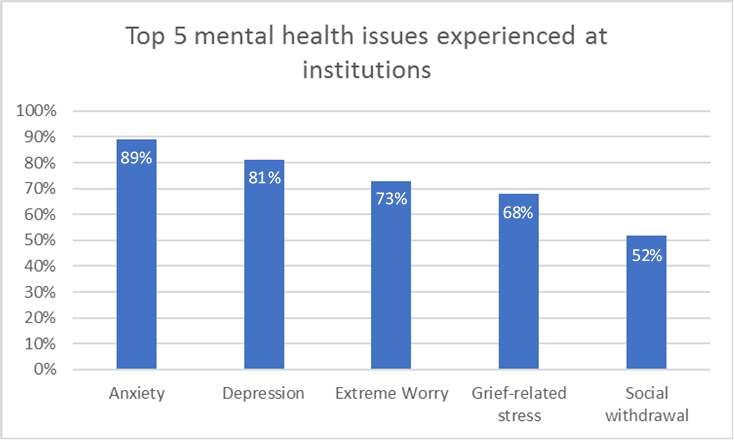Best practice in international student mental health

In 2017, English Australia surveyed over 95 English Language Teaching (ELT) colleges on mental health issues. Nearly 40 per cent of them reported speaking with students who had had suicidal thoughts and were not equipped with resources to support student mental health. In trying to address this concern, English Australia was prompted to write the ‘The Guide to Best Practice in International Student Mental Health’. This guide provides tools and information that will help create an environment where students feel supported should they ever have any mental health concerns.
You can watch the full recording of Sophie O’Keefe discussing the guide here. Keep reading for a summary of the ideas below.
Common issues in ELICOS student mental health
In English Australia’s 2017 survey, over 50 per cent of colleges believed that student mental health issues had increased in the last two years. In the past two years, mental health difficulties that have been experienced by students include: anxiety (89%), depression (81%), extreme worry (73%), grief-related stress (68%) and social withdrawal (52%).
Challenges in providing student mental health support
The top challenges for ELICOS (English Language Intensive Courses for Overseas Students) centres in addressing student mental health are:
- Stigma and students not seeking help: Students may feel reluctant to engage with support services for fear of their family finding out, or how it might affect their grades or study progress.
- Lack of staff expertise and training: While many colleges have engaged in Mental Health First Aid training and Applied Suicide Intervention Skills Training (ASIST), some staff may still have had little exposure to, or experience with, mental health issues.
- Non-disclosure issues before arrival: 95 per cent of colleges said that they had an opportunity on their enrolment forms for students to pre-disclose mental health issues before they arrived, however hardly any students ever did this.
- High demand for counselling and limited human resources: Some colleges said that there could be up to a 2 week wait for students to access available services.
- Language barriers: Most colleges said they weren’t using interpreters on a regular basis.
- Clarification around confidentiality: There is concern among some ELICOS colleges about understanding and clarifying the limits of confidentiality, especially with students under 18 years of age.
- Identifying students early: Many colleges said that the first time they realised a student was experiencing a mental health issue was when it had reached a crisis point.
Essential elements of best practice
Here are some guidelines for effective practice to help English language colleges in Australia develop their policies and procedures around mental health services (see more pg. 23-42 in the Guide):
This Guide is packed full of case studies and best practice examples from colleges who have had to support international students experiencing mental health issues.
The Guide also provides additional resources such as contact information for general and specific service providers that deal with mental health, and an annotated set of further reading suggestions which can help those who wish to pursue information in more depth.
To continue the conversation, contact Sophie O’Keefe, or share your thoughts and ideas on mental health best practice via Yammer, Twitter and/or LinkedIn with the hashtag #intled.
References
- English Australia. (2018). Guide to Best Practice in International Student Mental Health 2018. Retrieved from https://www.englishaustralia.com.au/documents/item/493

